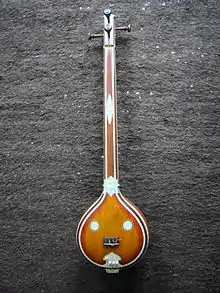Madras Music Season
Chennai Music Season is an event hosted every Mid November–January in Chennai (formerly known as Madras) Tamil Nadu. Spanning some 9 weeks, it comprises top-flight professional and amateur musicians .[1] The traditional role of the Music Season is to allow aficionados of Carnatic music to appreciate performances by renowned artists, and to allow promising young artists to display their talent and skill. Audiences and artists come from across India and her diaspora to enjoy the season.
| Carnatic music |
|---|
 |
| Concepts |
| Compositions |
| Instruments |
|
History
The Madras Music Season was first created in the 1927 by a group of individuals who later went on to establish the Madras Music Academy.[2] Concerts would be held at various venues at different places every year, before the Madras Music Academy settled on its present venue at T.T.K. Road.[2] Although the season was initially held during March/April (the Tamil month of Panguni), the timing of the season was later changed to December (the Tamil month of Maargazhi) due to more favourable weather conditions and the likelihood of attracting more tourists during this period.[2]
The All India Music Conference was held in 1927 concurrently with the annual session of Indian National Congress in Madras. A resolution was passed at the conference to formally establish the Madras Music Academy. From 1928, the academy started organizing the Music Season every year during the month of December.[3]
Previously it was a traditional month-long Carnatic music festival solely consisting of Carnatic music concerts, harikathas, lecture demonstrations (otherwise known as lec-dems) and award/title ceremonies. However, over the years it has also diversified into dance and drama, as well as non-Carnatic art forms, and is now of a duration of at least six weeks.
The festival
The Music Season has grown over the years, and has been described as one of the world's largest cultural events.[4] Generally, the concerts take place in the afternoons and nights, and consists of all sorts of Carnatic music compositions and improvisations.[5] In 2004–2005, there were over 1200 performances by about 600 artists (about 700 vocal, 250 instrumental, 200 dance, 50 drama and others).[6]
Sabhas and Halls
The performances are typically organised by sabhās. A Carnatic sabhaa is an organisation that helps conduct concerts and bestow titles and awards to artists to recognise talent. Most sabhaas own a hall (or two). Some smaller sabhaas rent a hall during the season. Generally, the main halls, on average, can accommodate about 300 people while the mini can take no more than 75 people. Most performances are held in such halls.
Prominent Sabhas
The following prominent sabhaas have regularly organised concerts during the Music Season:
- Brahma Gaana Sabhaa: Sivagami Pethaachi Auditorium
- Chennai Cultural Academy Trust
- Indian Fine Arts Society:[7] Baala Mandir German Hall
- Kalaarasana:[7] Rani Seethai Hall
- Kalaa Pradarshini:[7] Bhaarathiya Vidyaa Bhavan Auditorium, Mylapore
- Kaartik Fine Arts[7]
- Madras Music Academy:[7] T. T. Krishnamachari Auditorium
- Mudra : Freedom Hall
- Mylapore Fine Arts Club[7]
- Naadha Inbam : Raaga Sudhaa Hall
- Narada Gana Sabha:[7] Sathguru Gnaanananda Hall
- Rasika Ranjani Sabhaa : Dakshinamoorthy Auditorium
- Sri Krishna Gaana Sabhaa:[7] Sri Krishna Gaana Sabhaa
- Sri Paarthasaarathy Swaami Sabhaa : Vidyaa Bhaarathi
- Sri Thyaaga Brahma Gaana Sabhaa:[7] Vaani Mahaal
- Tamil Isai Sangam:[7] Raja Annaamalai Chettiar Hall
- Hamsadhwani NRI Sabha
- Singapore Indian Fine Arts Society : Tatvaloka, Teynampet
- Triplicane Music Festival; NKT Muthu Hall
- TAPAS Music and Dance Festival
- Sat Sangam Sabhaa - Madipaakkam
- Chennaiyil Thiruvaiyaaru - Kaamaraajar Arangam
Free Kutcheris
Most of the Sabhas have free concerts in the morning and afternoon slots. Only the evening slots starting from around 4 pm are ticketed in most Sabhas.
All Concerts at Bharathi Vidya Bhavan are free. They start the season a bit ahead but all popular artists sing here. SIFA holds concerts at Tattvaloka, Teynampet and all concerts are free Concerts at Narada Gana Sabha mini hall, Obul reddy hall at Vani Mahal and Kamakoti hall in Krishna Gana Sabha are also usually free.
The Music Season 2013 was when live Streaming technology embraced carnatic music when Parivadini launched the first Parivadini award[8] and also started streaming live carnatic concerts[9] for free.
Season tickets and tickets for Individual concerts
Season tickets are available at various denominations in all major Sabhas. At the music academy, season tickets are mostly sold out on the first day, which is mostly in the first week of December. Individual concerts tickets are available only starting from morning on the day of the concert
Most of the other Sabhas have advance booking for individual concerts, at the respective venues, mostly starting from First week of December. Brahma Gana Sabha and the Chennaiyil Thiruvayyaru have online ticket booking facility.
Notes
- Nettl (2005), p38
- Lakshmi (2004), p123
- Knight (2010), p78
- The Hindu : Opinion / Editorials : MUSIC MUSINGS
- Nettl (1995), p90
- Chennai Music Season 2004 - 2005
- Sri Shanmukhaananda Fine Arts & Sangeetha Sabhaa - Shanmukha 1986, p44
- Another bastion breached, dalit Christian awarded - Times of India
- "Parivadini". Archived from the original on 16 August 2016. Retrieved 22 March 2020.
References
- Lakshmi, C. S. (2004). The Unhurried City: Writings on Chennai. Chennai: Penguin Books India.
- Nettl, Bruno (2005). The Study of Ethnomusicology: Thirty-one Issues and Concepts. Illinois: University of Illinois Press.
- Nettl, Bruno (1995). Heartland Excursions: Ethnomusicological Reflections on Schools of Music. Illinois: University of Illinois Press. ISBN 9780252064685.
- Knight, Douglas M. Jr. (2012). Balasaraswati: Her Art and Life. Wesleyan University Press. ISBN 9780819569066.
External links
- Editorial in The Hindu
- Madras Music Academy
- carnatic india Page on Chennai music season 2008 -09
- ART INDIA Information on Concerts